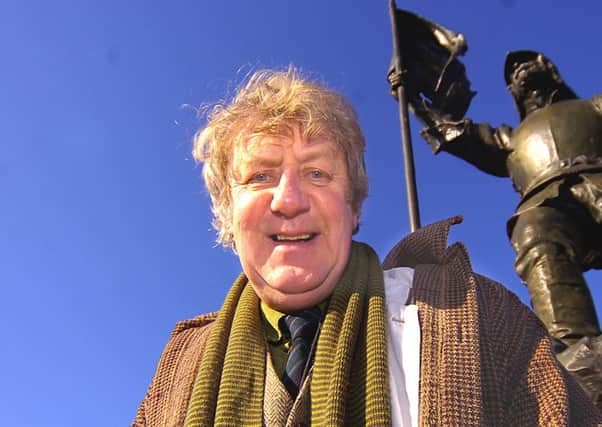Theatre: Grid Iron's examination of Scottish justice


It’s 21 years now since Grid Iron first exploded onto the Scottish theatre scene, as brilliant Edinburgh-based pioneers of the site-specific and site-responsive theatre movement that would sweep across UK and international theatre over the next decade.
From their unforgettable version of Angela Carter’s Bloody Chamber, presented in Mary King’s Close before it became a tourist attraction, through the Rabelais show Gargantua that was the first ever staged in the venue now known as the Underbelly, to shows played out in play parks across Scotland, an island off Stavanger in Norway, a mortuary in Cork, and the top floor of Debenham’s in Princes Street, the company led by producer-director Judith Doherty and director Ben Harrison – who met at university in Edinburgh 25 years ago – has taken audiences to places they have never seen before, not only physically, but also creatively and emotionally.
Advertisement
Hide AdSo it’s hardly surprising that when the company decided, back in 2011, to turn their attention towards Scotland’s justice system, their first thought was to try to present the show in Edinburgh’s High Court, or in the nearby Sheriff Court in Chambers Street. In the end, it was not to be; the time constraints were too severe, the architecture of the spaces too rigid, the politics of presenting a show potentially critical of the system, in spaces dedicated to upholding the system, a little too complicated.
Yet by the time the Traverse Theatre came on board as a co-producer of the project, 18 months ago, the company were feeling increasingly confident about staging Jury Play in a large flexible theatre space like Traverse One, not least so that the play could actively challenge our assumptions about how a courtroom should look, and the respective roles of the various familiar characters in the courtroom “drama” – the judge, the advocates, the accused, and the 15 good citizens and true who, in Scotland, make up the jury in criminal trials.
“This whole project was inspired by the work of the brilliant criminologist Dr Jenny Scott, who we first worked with back in 2011 on our project What Remains,” says Harrison. “Jenny has been a performer herself, and her current research is about the way courtrooms work, and the different roles people play there – in particular, the role played by the jury. So she has co-written this play with me, and we’ve very much worked on it together, step by step.”
Although it will take place in a theatre – and most of the audience will be seated in the normal way – Jury Play is still involved in that restless exploration of the relationship between performers and audience that is the hallmark of Grid Iron’s work. In this case, audience members will be asked as they arrive whether they are willing to act as jury members or not; then a random selection of those who have volunteered will be called on stage to become the jury in the case. This introduces an elements of uncertainty to the unfolding of the story, for which all of Harrison’s seven-strong cast must be prepared; and the brilliant Scottish stage veteran John Bett, playing the judge, says that although he expects most of his words to be scripted, he is ready to improvise if necessary.
“I do love the kind of theatre that contains a strong element of information and factual material, as well as drama,” says Bett, who first shot to fame as a member of the legendary first 7:84 Scotland Company in 1973, as they toured Scotland updating the factual elements of The Cheviot, The Stag And The Black, Black Oil from show to show. “I spent a day in the High Court last week, watching judges dealing with various aspects of their work – sentencing, presiding over a criminal trial, consulting with defence and prosecution advocates about a matter of law; and I’m meeting a retired sheriff later, to try to get more insights into how the system works.
“Ben Harrison and I first discussed this project a few years ago, when we were doing workshops at Dundee based on Brecht’s Life Of Galileo, which involved an astronomer from the university there; then I was lucky enough to work on the development phase of this script back in 2015. So it’s great to be involved again; and although there’s always some element of risk, with a high level of audience participation, I see it as part of my job to keep the show on track – or at least to make sure that the dramatic soufflé doesn’t collapse, at a crucial moment.”
Advertisement
Hide AdOne of the main points of Scott’s research, though, is to suggest that conventional ideas about courtroom procedure are no longer working as well as they should, either for jurors who want to do a good job, or – crucially – for the accused; so we should expect a show that plays with and challenges our expectations of courtroom drama, from Agatha Christie to LA Law and beyond.
“I’ve always been a bit obsessed with courtroom dramas,” says Grid Iron’s producer-director Jude Doherty, “so it’s interesting that this show definitely isn’t one, although it refers back to the genre. Instead, we’ll be exploring new ideas about how juries might work, and the audience will be hearing some of the inner thoughts of the main players, as events unfold. It has a definite edge of unpredictability to it. And one good thing,” she adds with a laugh, “is that we do have a genuine authority figure on stage, in the shape of John Bett as the judge. I have a feeling that with this show, there might be performances where that will come in very handy indeed.”
Jury Play is at the Traverse Theatre, Edinburgh, 3-7 October